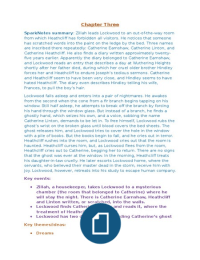Chapter Three
SparkNotes summary: Zillah leads Lockwood to an out-of-the-way room
from which Heathcliff has forbidden all visitors. He notices that someone
has scratched words into the paint on the ledge by the bed. Three names
are inscribed there repeatedly: Catherine Earnshaw, Catherine Linton, and
Catherine Heathcliff. He also finds a diary written approximately twenty-
five years earlier. Apparently the diary belonged to Catherine Earnshaw,
and Lockwood reads an entry that describes a day at Wuthering Heights
shortly after her father died, during which her cruel older brother Hindley
forces her and Heathcliff to endure Joseph’s tedious sermons. Catherine
and Heathcliff seem to have been very close, and Hindley seems to have
hated Heathcliff. The diary even describes Hindley telling his wife,
Frances, to pull the boy’s hair.
Lockwood falls asleep and enters into a pair of nightmares. He awakes
from the second when the cone from a fir branch begins tapping on his
window. Still half asleep, he attempts to break off the branch by forcing
his hand through the window glass. But instead of a branch, he finds a
ghostly hand, which seizes his own, and a voice, sobbing the name
Catherine Linton, demands to be let in. To free himself, Lockwood rubs the
ghost’s wrist on the broken glass until blood covers the bed sheets. The
ghost releases him, and Lockwood tries to cover the hole in the window
with a pile of books. But the books begin to fall, and he cries out in terror.
Heathcliff rushes into the room, and Lockwood cries out that the room is
haunted. Heathcliff curses him, but, as Lockwood flees from the room,
Heathcliff cries out to Catherine, begging her to return. There are no signs
that the ghost was ever at the window. In the morning, Heathcliff treats
his daughter-in-law cruelly. He later escorts Lockwood home, where the
servants, who believed their master dead in the storm, receive him with
joy. Lockwood, however, retreats into his study to escape human company.
Key events:
Zillah, a housekeeper, takes Lockwood to a mysterious
chamber (the room that belonged to Catherine) where he
will stay the night. There is Catherine Earnshaw, Heathcliff
and Linton written, or scratched, into the walls.
Lockwood finds Catherine’s diary and reads it, where the
treatment of Heathcliff is spoken of
Lockwood has two dreams, one including Catherine’s ghost
Key themes/ideas:
Dreams
, Supernatural
Idea of the movement of the book- away from Earnshaw and
back, where the movements must be through Heathcliff.
This is seen through the names written on the wall, read
from left to right, they represent Catherine’s journey from a
child (Earnshaw) to her years with Heathcliff (Heathcliff) to
her adulthood and marriage (Linton). However, read from
right to left it mirrors her daughter, Cathy’s life, starting as
she was born (Linton) to her marriage to Linton Heathcliff
(Heathcliff) and finally to her marriage to Hareton
(Earnshaw).
Lockwood:
In the forbidden chamber, which once belonged to
Catherine, he “felt secure against the vigilance of Heathcliff,
and every one else” which mirrors Catherine’s sense of
safety in this room
He dreams about attempting to get home, with Joseph, but
is unable to as he becomes surrounded by violence- “several
clubs crossed; bows, aimed at me” “every man’s hand was
against his neighbour”. Can represent his distress.
He also dreams of Catherine’s ghost, where “Terror made
me cruel” and when he awoke he was “shuddering yet, and
wiping the perspiration from my forehead.”
Returns home “feeble as a kitten.”
Heathcliff:
When Lockwood reads Catherine’s diary, he learns about
the treatment of Heathcliff as a child by his adopted brother,
Hindley- “his conduct to Heathcliff is atrocious” “Frances
darling, pull his hair as you go by” “Poor Heathcliff” “swears
he will reduce him to his right place”
Both Heathcliff and Catherine are seen to reject religion
after the tyrant Hindley acts cruelly- when given a religious
book, she “hurled it into the dog kennel” and he “kicked his
into the same place”
Heathcliff is seen to be close to Catherine, who, in her diary,
appears sympathetic to his treatment and refers to his as
“H”.
Aggressive/violent behaviour- “crushing his nails into his
palms, and grinding his teeth” “nothing could excuse it,
unless you were having your throat cut” anger could be a




